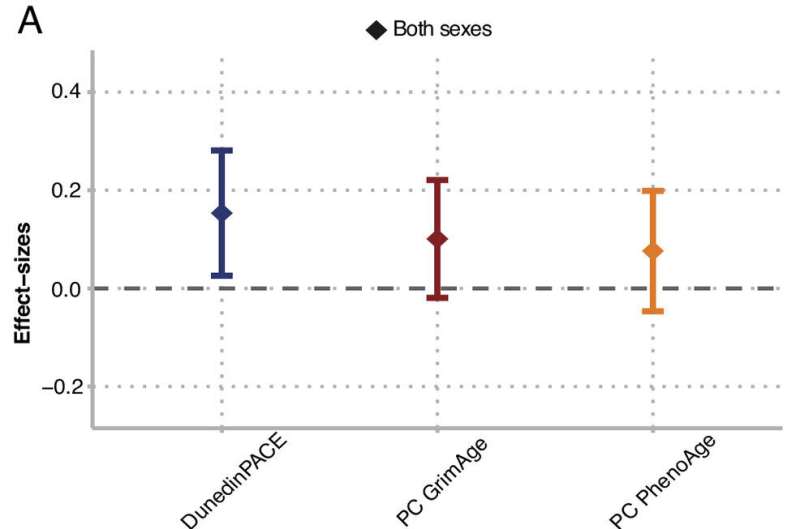This article has been reviewed according to Science X's editorial process and policies. Editors have highlighted the following attributes while ensuring the content's credibility:
fact-checked
peer-reviewed publication
trusted source
proofread
Study determines in utero undernutrition contributes to accelerated biological aging

Babies born after exposure to famine in-utero show signs of accelerated aging six decades later, according to a study at Columbia University Mailman School of Public Health and the Robert N. Butler Columbia Aging Center. The effects of famine were consistently larger for women and near zero for men. The results are published in the journal Proceedings of the National Academy of Sciences.
The Dutch famine that took place between November 1944 and May 1945 at the time of the German surrender in World War II was initiated by a food supply embargo imposed by the German occupying forces in early October 1944. During that time, food in the affected regions of the Netherlands was rationed. The researchers used ration records to define the famine period when aggregate food intake fell below 900 kcal/day.
Biological aging is thought to arise from an accumulation of cellular-level changes that progressively undermine the resilience of cells, tissues, and organs, directly impacting how fast people lose function and develop disease as they get older.
"We know from prior studies of several famines that people exposed in-utero later may develop health problems" explained Mengling Cheng, lead author of the study and a Marie Curie Ph.D. fellow at the University of Lausanne who worked on the project during a research stay at Columbia's Aging Center. "Our goal in this study was to test the hypothesis that this increased risk might be related to accelerated biological aging."
"Studies of famine can be a powerful tool for understanding how insults that occur very early in life affect our health and development," said Daniel Belsky, associate professor of Epidemiology in the Aging Center, the host of Cheng's research stay, and senior author of the study. "In this study, we used the famine as a kind of 'natural experiment' to investigate how undernutrition and stress during fetal development could impact biological processes of aging many decades later."
The accelerated aging the researchers documented in the famine survivors is associated in other studies with shorter lifespan and earlier onset of cardiovascular disease, stroke, dementia, and physical disability. "Our results suggest these survivors could be on trajectory for shorter healthy lifespans," said Belsky.
The researchers analyzed data from the Dutch Hunger Winter Families Study (DHWFS), a natural-experiment birth-cohort study of 951 survivors of in-utero exposure to famine conditions. They examined changes in DNA methylation—or chemical tags on the DNA that regulate gene expression and that are known to change with aging. These algorithms are often referred to as "epigenetic clocks."
Based on blood samples collected when the survivors were age 58, the researchers quantified biological aging using the DunedinPACE tool developed by Belsky and colleagues at Duke University and the University of Otago in New Zealand. The clock measures how fast a person's body is deteriorating as they grow older, "like a speedometer for the biological processes of aging," as Belsky explains. For comparison purposes, Belsky and colleagues also analyzed two other epigenetic clocks—GrimAge and PhenoAge.
Famine survivors had faster DunedinPACE, as compared with controls. This effect was strongest among women with little signs of affecting the pace of aging among the men studied.
The data for the 951 cohort members included 487 famine survivors with available DNA data, 159 time-controls, and 305 sibling controls. Time-controls were born before or after the famine in the same hospitals as the survivors and their same-sex siblings.
Comparisons were made to unexposed controls on three DNA measures of biological aging at each of six time windows from the preconception period through the end of gestation. In addition, the full sample of cohorts were interviewed, and nearly all participated in a clinical exam when DNA was collected.
"While there is no gold standard to measure biological aging, the overall consistency of findings across three different epigenetic clock measures of biological aging developed in different cohorts using different endpoints builds confidence that our findings do capture aging processes," said Belsky.
"As a matter of fact we consider our estimates of famine to be conservative," noted L.H. Lumey, MD, Ph.D., professor of Epidemiology at Columbia Mailman and the founder of the Dutch Hunger Winter Families Study in which the research was conducted. Lumey has conducted a number of studies among famine cohorts in the Netherlands, Ukraine, and China.
"The extent to which differences observed in measures of biological aging will translate into further differences in health span and lifespan remains to be determined. Therefore, mortality follow-up of this cohort is needed as survivors of in-utero famine exposure are approaching their ninth decade of life."
Co-authors are Dalton Conley, Tom Kuipers, Chihua Li, Calen Ryan, Jazmin Taeubert, Shuang Wang, Tian Wang, Jiayi Zhou, Lauren L. Schmitz, Elmar W. Tobi, and Bas Heijman (affiliations are listed in the linked paper).
More information: Mengling Cheng et al, Accelerated biological aging six decades after prenatal famine exposure, Proceedings of the National Academy of Sciences (2024). DOI: 10.1073/pnas.2319179121



















